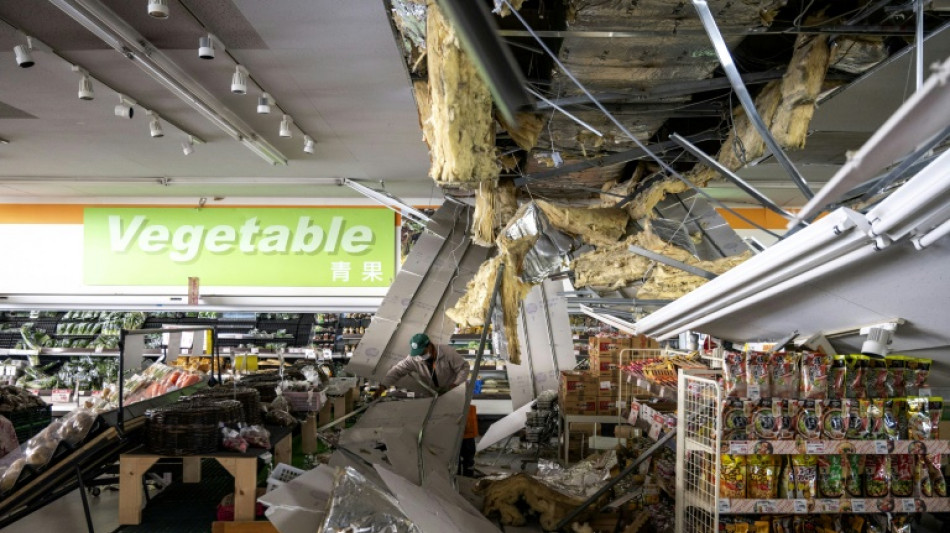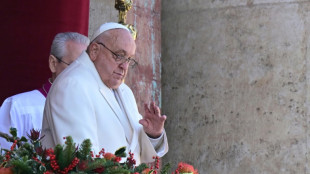
-
 Azerbaijan mourns 38 killed in plane crash in Kazakhstan
Azerbaijan mourns 38 killed in plane crash in Kazakhstan
-
Konstas and Khawaja put Australia on top in 4th Test against India

-
 Lakers pip Warriors after another LeBron-Curry classic
Lakers pip Warriors after another LeBron-Curry classic
-
India readies for 400 million pilgrims at mammoth festival

-
 Nepal hosts hot air balloon festival
Nepal hosts hot air balloon festival
-
Asia stocks up as 'Santa Rally' persists

-
 Tears, prayers as Asia mourns tsunami dead 20 years on
Tears, prayers as Asia mourns tsunami dead 20 years on
-
Sydney-Hobart yacht crews set off on gale-threatened race

-
 Key public service makes quiet return in Gaza
Key public service makes quiet return in Gaza
-
Fearless Konstas slams 60 as Australia take upper hand against India

-
 Bridges outduels Wembanyama, Celtics lose again
Bridges outduels Wembanyama, Celtics lose again
-
Hungry Sabalenka ready for more Slam success

-
 Mass jailbreak in Mozambique amid post-election unrest
Mass jailbreak in Mozambique amid post-election unrest
-
Azerbaijani jet crashes in Kazakhstan, killing 38

-
 Bridges outduels Wembanyama as Knicks beat Spurs
Bridges outduels Wembanyama as Knicks beat Spurs
-
2004 Indian Ocean tsunami: what to know 20 years on

-
 Asia to mourn tsunami dead with ceremonies 20 years on
Asia to mourn tsunami dead with ceremonies 20 years on
-
Syrians protest after video of attack on Alawite shrine

-
 Russian state owner says cargo ship blast was 'terrorist attack'
Russian state owner says cargo ship blast was 'terrorist attack'
-
38 dead as Azerbaijani jet crashes in Kazakhstan

-
 Crisis-hit Valencia hire West Brom's Corberan as new boss
Crisis-hit Valencia hire West Brom's Corberan as new boss
-
Suriname ex-dictator and fugitive Desi Bouterse dead at 79

-
 35 feared dead as Azerbaijani jet crashes in Kazakhstan
35 feared dead as Azerbaijani jet crashes in Kazakhstan
-
Pope calls for 'arms to be silenced' in Christmas appeal

-
 Syria authorities say torched 1 million captagon pills
Syria authorities say torched 1 million captagon pills
-
Pope calls for 'arms to be silenced' across world

-
 32 survivors as Azerbaijani jet crashes in Kazakhstan
32 survivors as Azerbaijani jet crashes in Kazakhstan
-
Pakistan air strikes kill 46 in Afghanistan, Kabul says

-
 Liverpool host Foxes, Arsenal prepare for life without Saka
Liverpool host Foxes, Arsenal prepare for life without Saka
-
Japan FM raises 'serious concerns' over China military buildup

-
 Pope's sombre message in Christmas under shadow of war
Pope's sombre message in Christmas under shadow of war
-
Zelensky condemns Russian 'inhumane' Christmas attack on energy grid

-
 Sweeping Vietnam internet law comes into force
Sweeping Vietnam internet law comes into force
-
Pope kicks off Christmas under shadow of war

-
 Catholics hold muted Christmas mass in Indonesia's Sharia stronghold
Catholics hold muted Christmas mass in Indonesia's Sharia stronghold
-
Japan's top diplomat in China to address 'challenges'

-
 Thousands attend Christmas charity dinner in Buenos Aires
Thousands attend Christmas charity dinner in Buenos Aires
-
Demand for Japanese content booms post 'Shogun'

-
 As India's Bollywood shifts, stars and snappers click
As India's Bollywood shifts, stars and snappers click
-
Mystery drones won't interfere with Santa's work: US tracker

-
 Djokovic eyes more Slam glory as Swiatek returns under doping cloud
Djokovic eyes more Slam glory as Swiatek returns under doping cloud
-
Australia's in-form Head confirmed fit for Boxing Day Test

-
 Brazilian midfielder Oscar returns to Sao Paulo
Brazilian midfielder Oscar returns to Sao Paulo
-
'Wemby' and 'Ant-Man' to make NBA Christmas debuts

-
 US agency focused on foreign disinformation shuts down
US agency focused on foreign disinformation shuts down
-
On Christmas Eve, Pope Francis launches holy Jubilee year

-
 'Like a dream': AFP photographer's return to Syria
'Like a dream': AFP photographer's return to Syria
-
Chiefs seek top seed in holiday test for playoff-bound NFL teams

-
 Panamanians protest 'public enemy' Trump's canal threat
Panamanians protest 'public enemy' Trump's canal threat
-
Cyclone death toll in Mayotte rises to 39


Two dead in powerful Japan quake
Two people were killed and dozens injured in a powerful overnight earthquake that rattled large parts of east Japan and prompted a tsunami warning, authorities said Thursday.
Residents and officials in the country's northeast were still trying to assess the damage early on Thursday, after the 7.4-magnitude quake that hit shortly before midnight.
A tsunami warning for waves of up to a metre in parts of northeast Japan was lifted in the early hours of Thursday, after authorities recorded water levels up to 30cm higher than usual in some areas.
Multiple smaller jolts continued to hit the region throughout the night and morning on Thursday.
Initial reports of damage appeared relatively minor, in a country with tough building codes intended to protect against devastation from frequent earthquakes, and officials said there were no abnormalities at nuclear plants.
"We're doing our best to assess the extent of the damage," government spokesman Hirokazu Matsuno told reporters overnight.
"Major aftershocks often happen a couple of days after the first quake, so please stay away from any collapsed buildings... and other high-risk places," he added.
Two people were killed in the quake, one in the Fukushima region and a second in neighbouring Miyagi, according to the Fire and Disaster Management Agency, with over 90 people injured across several regions.
The quake struck at a depth of 60 kilometres (37 miles) off the Fukushima coast and was preceded minutes earlier by another strong 6.1-magnitude shake in the same area, Japan's Meteorological Agency said.
The night-time shaking came just days after Japan marked the 11th anniversary of a massive quake that triggered a deadly tsunami and the Fukushima nuclear catastrophe.
The overnight quake produced strong shaking in the coastal northeast, where items were thrown from the shelves of convenience stores and bookcases toppled over in homes.
The jolts also rattled the capital and temporarily plunged parts of Tokyo and other areas into darkness.
Around two million homes lost power in the capital and elsewhere in the immediate aftermath of the quake, but it was progressively restored throughout the night. Around 35,600 homes in the Miyagi and Fukushima areas were still without power on Thursday morning, electricity firm TEPCO said.
- 'Extremely violent shaking' -
Japan's nuclear authority said no abnormalities were detected at the Fukushima plant that went into meltdown in 2011 when the tsunami hit, while pumps for cooling pools at some reactors temporarily halted but resumed operation shortly afterwards.
Some damage was reported, including the collapse of a stone wall at the site of Aoba castle in Sendai city, and Shinkansen bullet train derailed north of Fukushima city.
There were no injuries in the derailment, but 75 passengers and three staff on board were trapped for four hours before being able to escape the train.
An official in the emergency department of the local government of Ishinomaki told AFP overnight he had been woken by "extremely violent shaking".
"I heard the ground rumbling. Rather than feeling scared, I immediately remembered the Great East Japan Earthquake," he said, referring to the 2011 disaster.
Japan sits on the Pacific "Ring of Fire", an arc of intense seismic activity that stretches through Southeast Asia and across the Pacific basin.
The country is regularly hit by quakes, but it remains haunted by the memory of the 2011 catastrophe which left 18,500 people dead or missing, most in the tsunami.
Around the stricken Fukushima plant, extensive decontamination has been carried out, and no-go zones now cover just 2.4 percent of the region, down from 12 percent, though populations in many towns remain far lower than before 2011.
Ch.Kahalev--AMWN